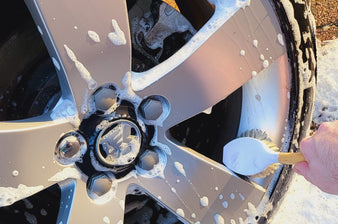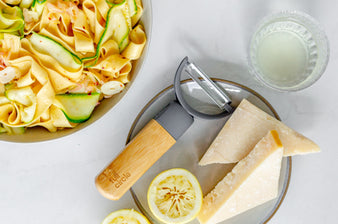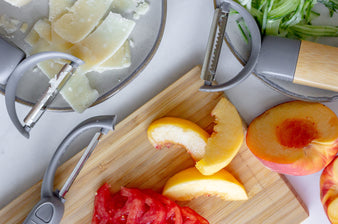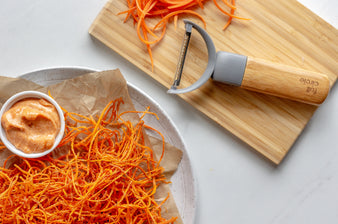Spoiled Rotten No More
One of the things we love best about this time of year is the produce – each week something new is “in season” and our CSA delivery and local grocery store don’t disappoint (we hope you were able to score some ramps like we were last week!). But something we struggled with long before the pandemic and are noticing much more now that we are cooking at a greater rate and keeping more groceries in the house is that produce is tricky and knowing how to keep it fresh and long-lasting is important.
So, we thought we’d share with you our tips on how to keep and store your produce.
Fruit. Should always be stored separate from vegetables (two separate drawers are what most fridges have for this). Off the vine fruits ripen, whereas vegetables just rot – this is because fruits release a ripening agent called ethylene. Apples, pears, citrus, berries, and pomegranates should be stored in the fridge, while stone fruits, melons, bananas, and tomatoes should be kept out in a cool place out of direct sunlight until they are ripe. Once ripe, you can pop them in the fridge if you’re not immediately ready to eat them because they will only go bad faster at room temperature. Also, be sure to keep them away from your good produce in the fridge since they continue to release ethylene and could speed up the life of your other fruits and veggies.
Vegetables. Most vegetables are best kept in the refrigerator. Bags with good circulation are the best option (the produce bags that come with our Tote-ally are helpful for this!) as they allow air flow, keeping your vegetables fresh for longer. Keep in mind that potatoes should not be refrigerated – they are best kept in a cool, dark place like a larder, root cellar, or on the countertop where the least amount of sun shines.
Herbs. Herbs are tricky. Ever notice that sometimes your cilantro lasts for weeks and other times it wilts and is rendered unusable in mere days? Here’s the thing with herbs, they’re best stored washed and then wrapped in a mildly damp paper towel (or Tough Sheet, if you’re in the know) in an airtight container like one of our Ziptucks. However, if you get your herbs from your garden or fresh from the farmer’s market or a CSA, you can put them in a jar with a small amount of water – but again this only works with freshly cut herbs. Most packaged herbs have a short shelf life, sadly.
Alliums. Say what? Yeah, onions, shallots, garlic and the like are part of a family called alliums. The ones that have dried shells, like the aforementioned, should be kept in a cool, dark place, like your potatoes. The ones that have leaves or stalks like scallions, garlic scapes, chives, and our beloved ramps should be refrigerated.
And there you have it. Life extended for your produce.
So, we thought we’d share with you our tips on how to keep and store your produce.
Fruit. Should always be stored separate from vegetables (two separate drawers are what most fridges have for this). Off the vine fruits ripen, whereas vegetables just rot – this is because fruits release a ripening agent called ethylene. Apples, pears, citrus, berries, and pomegranates should be stored in the fridge, while stone fruits, melons, bananas, and tomatoes should be kept out in a cool place out of direct sunlight until they are ripe. Once ripe, you can pop them in the fridge if you’re not immediately ready to eat them because they will only go bad faster at room temperature. Also, be sure to keep them away from your good produce in the fridge since they continue to release ethylene and could speed up the life of your other fruits and veggies.
Vegetables. Most vegetables are best kept in the refrigerator. Bags with good circulation are the best option (the produce bags that come with our Tote-ally are helpful for this!) as they allow air flow, keeping your vegetables fresh for longer. Keep in mind that potatoes should not be refrigerated – they are best kept in a cool, dark place like a larder, root cellar, or on the countertop where the least amount of sun shines.
Herbs. Herbs are tricky. Ever notice that sometimes your cilantro lasts for weeks and other times it wilts and is rendered unusable in mere days? Here’s the thing with herbs, they’re best stored washed and then wrapped in a mildly damp paper towel (or Tough Sheet, if you’re in the know) in an airtight container like one of our Ziptucks. However, if you get your herbs from your garden or fresh from the farmer’s market or a CSA, you can put them in a jar with a small amount of water – but again this only works with freshly cut herbs. Most packaged herbs have a short shelf life, sadly.
Alliums. Say what? Yeah, onions, shallots, garlic and the like are part of a family called alliums. The ones that have dried shells, like the aforementioned, should be kept in a cool, dark place, like your potatoes. The ones that have leaves or stalks like scallions, garlic scapes, chives, and our beloved ramps should be refrigerated.
And there you have it. Life extended for your produce.




